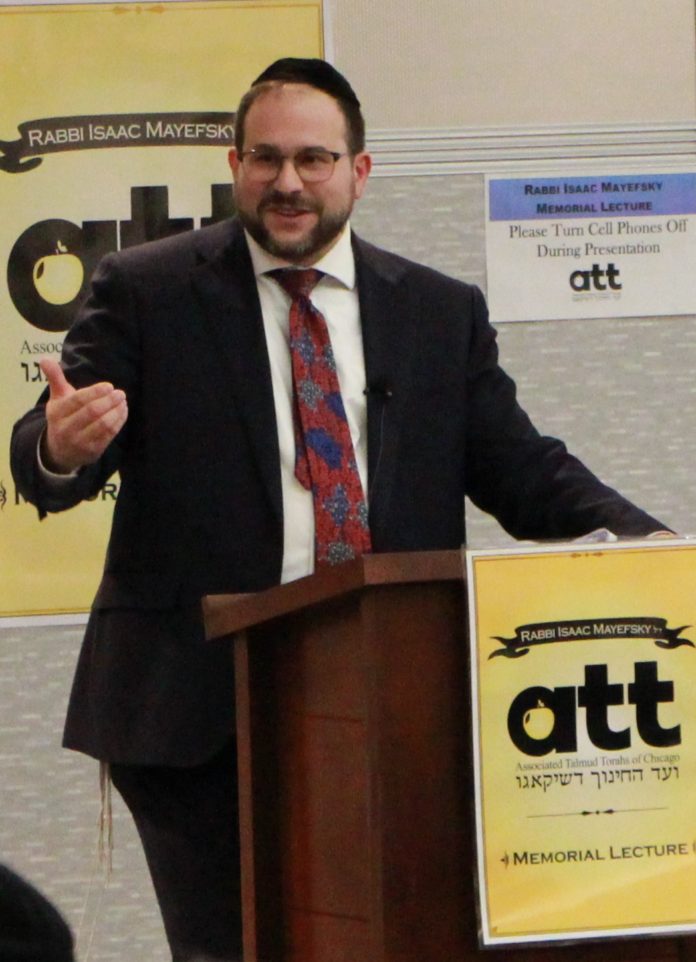Close to 200 parents of school-age children joined the Associated Talmud Torahs on Motzaei Shabbos, December 1, 2018 to attend the Thirty-second Annual Rabbi Isaac Mayefsky Memorial Lecture. This annual parenting program featured the renowned Rabbi, author, educator, and social worker, Rabbi Dani Staum.
The presentation, entitled “Raising Respectful Children,” focused on strategies for effective parenting. Rabbi Staum presented the importance of establishing respectful family relationships that enable parents to create an atmosphere of derech eretz in the home. He presented the following ideas that can help parents accomplish this:
- Parents need to demand respect from children – in that way, they honor their “fatherhood” and “motherhood” status (Rav Hirsch).
- Being respectful to a parent means that there are boundaries that children should not cross.
- Parents need to give a message that there is no tolerance for disrespect. Stay calm in the moment and deal with the situation later.
- How does one ask for respect? “Values aren’t taught as much as they are caught.” So modeling is very powerful and when parents show respect to their spouse and demand respect of their children to their spouse, this goes a long way to raising respectful children.
- Everything in life is based on relationships and everything is in the context of the relationship. Steven Covey references an “emotional bank account” in relationships and in life, and one needs to make deposits into and withdrawals from those accounts. Discipline is a withdrawal from the account.
- In an emotional state, chinuch will not happen. Need to diffuse the situation and then revisit the situation. Harder than what we do say to our children is what we don’t say.
- Our goal and dream is to build a Jewish home. What are some characteristics of the Jewish home?
- One must have happiness in a Jewish home and laughter.
- Need to be “real” in life and passionate about life. Remove yourself from the super-“Fishel” aspect of life.
- Make your home one in which “seldom is heard a discouraging word” – keep things positive. (Rav Belsky)
- Treat all children equally by treating all children differently.
- Teach gratitude – this defines who we are as Jews (from Yehudah) – model and demand gratitude. This is one of the greatest antidotes to disrespect.
- Set chores for your children – this garners respect and builds character.
- Hold children accountable – they will need to deal with the consequences of their behaviors.
- Parents need to set guidelines for children. “No” can be said to a child.
- Disrespect = chutzpah – from the words Chutz MiPoh = lack of boundaries. (Rav Hirsch) This is often due to egotistical self-centeredness.
- Not everything is chutzpah. Know the difference or you will respond too quickly and do more damage.
- Direct the energy of chutzpah to something positive.
- Why are children disrespectful? They know it works, they get our full attention, and they get what they want.
- In the realm of language, there is verbal and non-verbal communication. We need to discern the unspoken message. Try to figure out what’s going on behind the chutzpah and try not to use the word chutzpah. Sometimes, chutzpah is a show of anxiety.
Ultimately, chinuch is a long-term endeavor and the respectful values that are modeled and taught are ones that parents want their children to keep forever. The goal is for these values to be passed on from generation to generation.
This lecture is part of the ATT’s expanded program designed to address the challenges of creative teaching and rewarding parenting. Over the years, it has become an excellent resource for parents of children of all ages. To hear the lecture, visit www.att.org which has a link on its homepage.
Rabbi Isaac Mayefsky was a gifted educator who, in the course of more than 40 years of communal service, developed many key programs within the Associated Talmud Torahs, including the Russian Transitional Program and the Oscar & Bernice Novick P’TACH Learning Disabled Program.
This lecture is part of the ATT’s expanded program designed to address the challenges of creative teaching and rewarding parenting. Over the years, it has become an excellent resource for parents of children of all ages. For more information, contact the Associated Talmud Torahs of Chicago at 773-973-2828.







